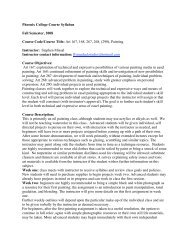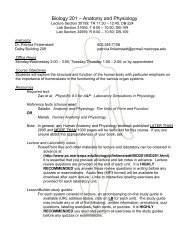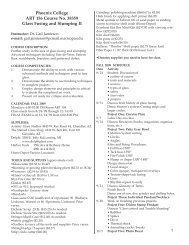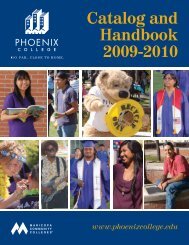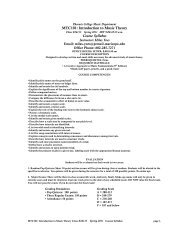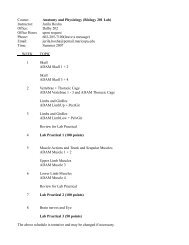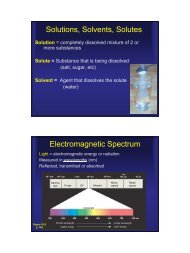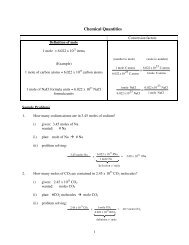Phoenix College Programs - Multiple Choices - Maricopa ...
Phoenix College Programs - Multiple Choices - Maricopa ...
Phoenix College Programs - Multiple Choices - Maricopa ...
Create successful ePaper yourself
Turn your PDF publications into a flip-book with our unique Google optimized e-Paper software.
182 • <strong>Phoenix</strong> <strong>College</strong> 2005-2006 Catalog<br />
DISTRIBUTION: 10 Credits<br />
Humanities & Fine Arts:<br />
Any approved General Education course in the Humanities<br />
& Fine Arts area.<br />
AJS123 recommended. 3<br />
Social & Behavioral Sciences:<br />
SOC101 Introduction to Sociology 3<br />
Natural Sciences:<br />
CHM130 Fundamental Chemistry + 3<br />
CHM130LL Fundamental Chemistry Lab + 1<br />
Program Prerequisites: None.<br />
Required Courses: 10 Credits<br />
AJS101 Introduction to Criminal Justice 3<br />
AJS213 Evidence Technology/Fingerprints (3) OR<br />
AJS213AB Fingerprint Classification I (1) AND<br />
AJS213AC Fingerprint Classification II + (1) AND<br />
AJS213AD Latent Development and Identification (1) 3<br />
AJS275 Criminal Investigation I 3<br />
AJS290BN Courtroom Testimony Seminar 1<br />
Human Services<br />
Department Chairperson: Dr. C. Viera<br />
Program Director: Mr. R. Wilson<br />
Evidence Technology<br />
Certificate of Completion — CCL 5877<br />
19 Credits<br />
The Evidence Technology curriculum is designed to prepare<br />
students for careers in the fields of forensics technology. It<br />
provides practitioners in the Evidence Technology field with<br />
the opportunity for academic growth and development in their<br />
specialized fields.<br />
Program Notes: Students must earn a grade of “C” or better in<br />
all courses required within the program. Additional options are<br />
available in the field of evidence technology. Consult catalog,<br />
Department Chair and/or the Advisement Center for details.<br />
Students planning to transfer to a four-year college or university<br />
should contact the Advisement Center for specific information<br />
about the general education requirements.<br />
Program Prerequisites: None.<br />
Required Courses: 19 Credits<br />
AJS101 Introduction to Criminal Justice 3<br />
AJS213 Evidence Technology/Fingerprints (3) OR<br />
AJS213AB Fingerprint Classification I (1) AND<br />
AJS213AC Fingerprint Classification II + (1) AND<br />
AJS213AD Latent Development and Identification (1) 3<br />
AJS215 Criminalistics: Physical Evidence 3<br />
AJS216 Criminalistics: Biological Evidence 3<br />
AJS241 Police Photography 3<br />
AJS275 Criminal Investigation I 3<br />
AJS290BN Courtroom Testimony Seminar 1<br />
Department Chairperson: Dr. C. Viera<br />
Program Director: Mr. R. Wilson<br />
Fingerprint Classification and Identification<br />
Certificate of Completion — CCL 5010<br />
10 Credits<br />
The Certificate of Completion in Fingerprint Classification and<br />
Identification is designed to prepare students for entry level<br />
positions in the field of fingerprint classification and<br />
identification.<br />
Program Notes: Students must earn a grade of “C” or better in<br />
all courses required within the program. Additional options are<br />
available in the field of evidence technology. Consult catalog,<br />
Department Chair and/or the Advisement Center for details.<br />
Department Chairperson: Dr. C. Viera<br />
Program Director: Mr. R. Wilson<br />
Justice Agencies Support<br />
Associate in Applied Science — AAS 3833<br />
67-70 Credits<br />
The Associate in Applied Science (AAS) in Justice Agencies<br />
Support is designed to prepare students for careers in<br />
administrative support positions in justice and other<br />
governmental agencies. Further, it provides civil servants<br />
already in these fields with the opportunity for academic<br />
growth, personal and professional development in supervisory<br />
and managerial skills.<br />
Program Notes: Students must earn a grade of “C” or better in<br />
all courses required within the program. Students planning to<br />
transfer to a four-year college or university should contact the<br />
Advisement Center for specific information about the general<br />
education requirements. The Justice Agencies Support program<br />
also provides certificates in Justice Agencies Support – Levels I<br />
and II.<br />
Program Prerequisites: None.<br />
Required Courses: 36 Credits<br />
JAS101 Introduction to Justice & Government Agency<br />
Administration 3<br />
JAS102 Principles of Management for Justice &<br />
Government Agencies I 3<br />
JAS110 Basic Principles of Government Fiscal<br />
Administration + 3<br />
JAS115 Basic Principles of Human Resources<br />
Mgt. for Justice & Government Agencies + 3<br />
JAS150 Organizational Behavior in Justice &<br />
Government Agencies + 3<br />
JAS200 Principles of Management for Justice &<br />
Government Agencies II + 3<br />
JAS225 Statistics for Social Research/Justice &<br />
Government + 3<br />
JAS250 Managing Individuals in Groups for Justice &<br />
Government Agencies + 3<br />
BPC110Computer Usage and Applications 3<br />
SOC101 Introduction to Sociology 3<br />
SOC140 Racial and Ethnic Minorities 3<br />
SOC251 Social Problems + 3<br />
Restricted Electives: 9-12 Credits<br />
CFS257<br />
Working with Families with Diverse<br />
Needs 3<br />
SOC157 Sociology of Marriage and Family 3<br />
SOC245 Social Deviance + 3<br />
SWU171 Introduction to Social Welfare + 3



